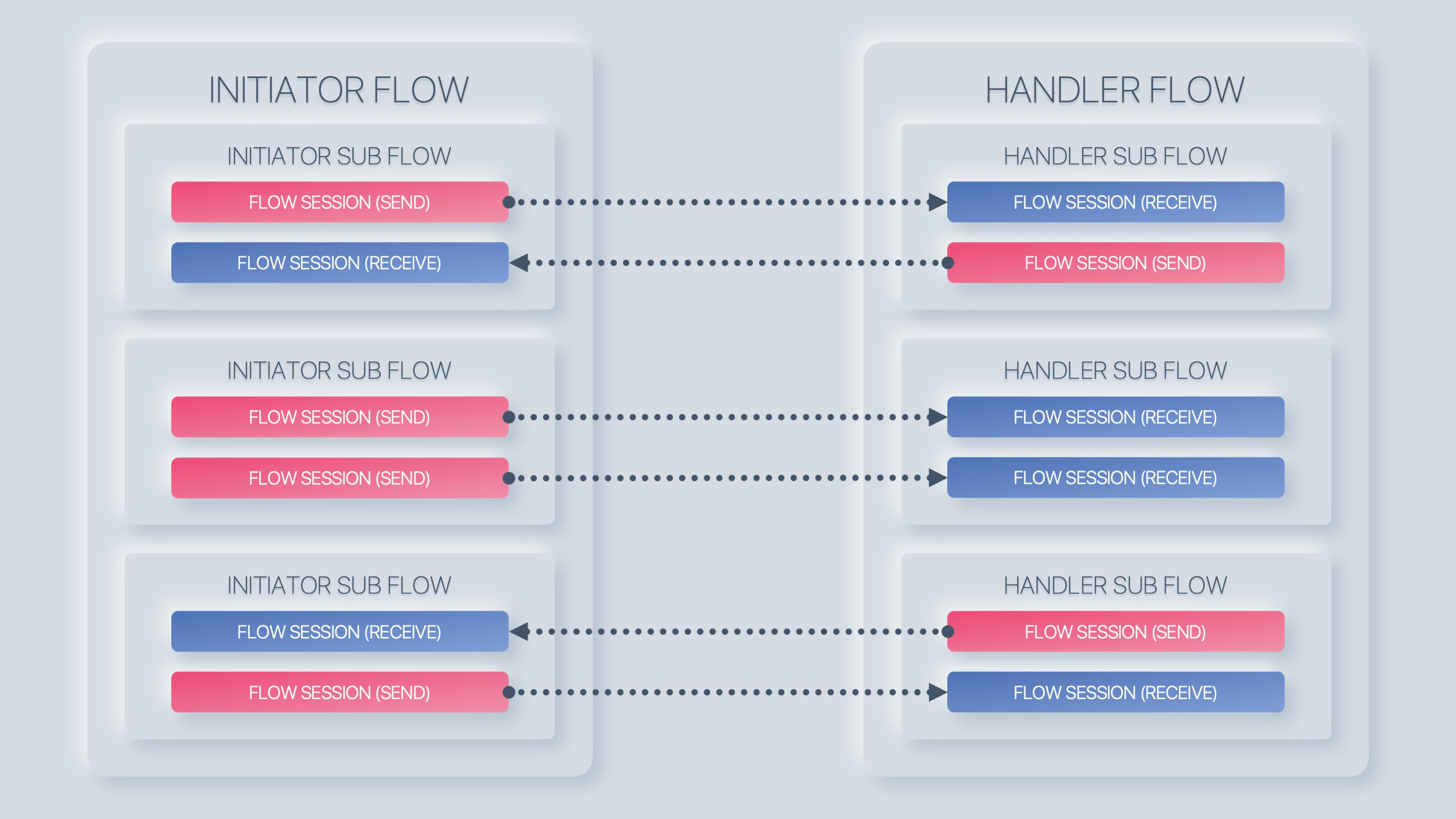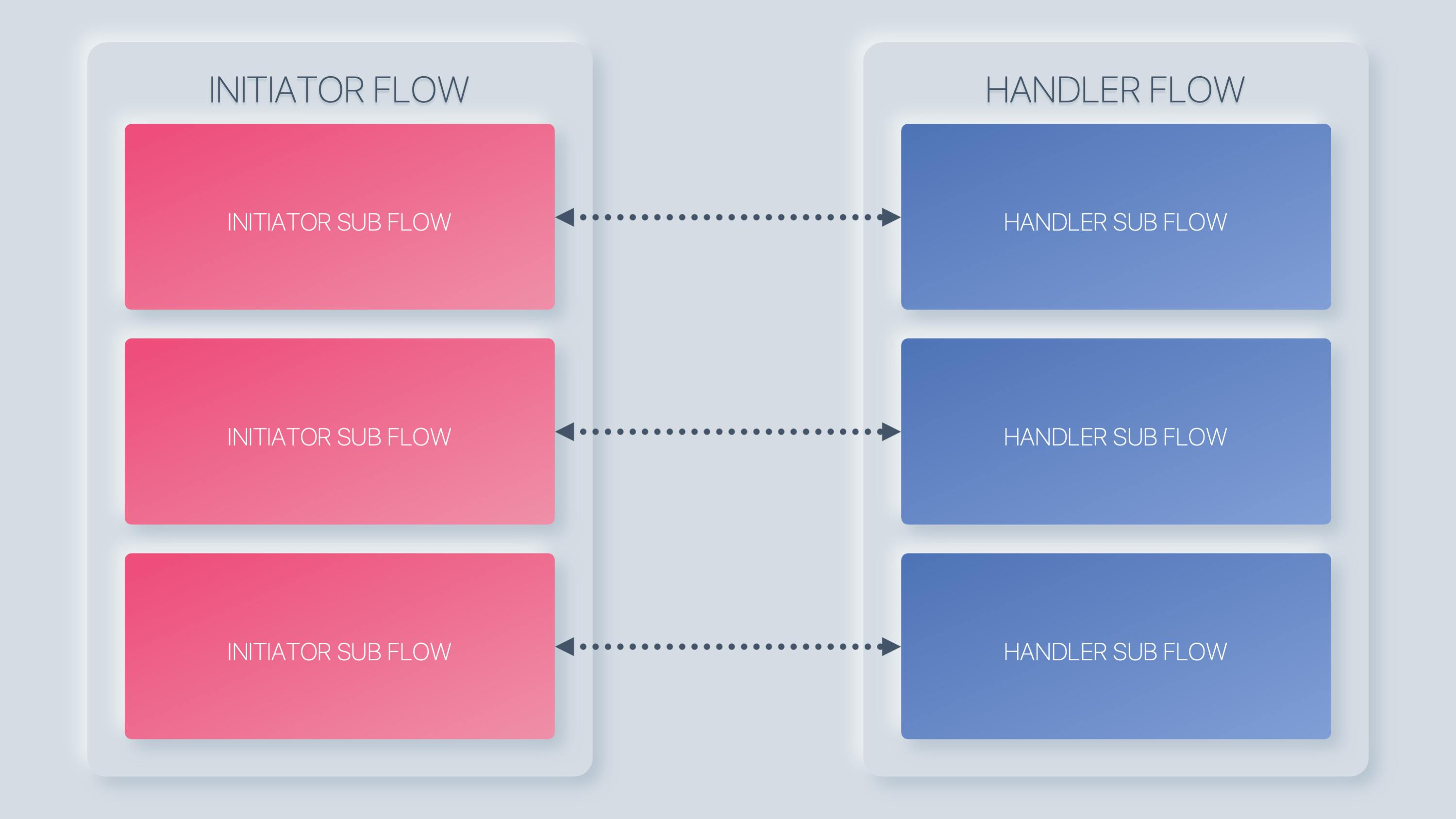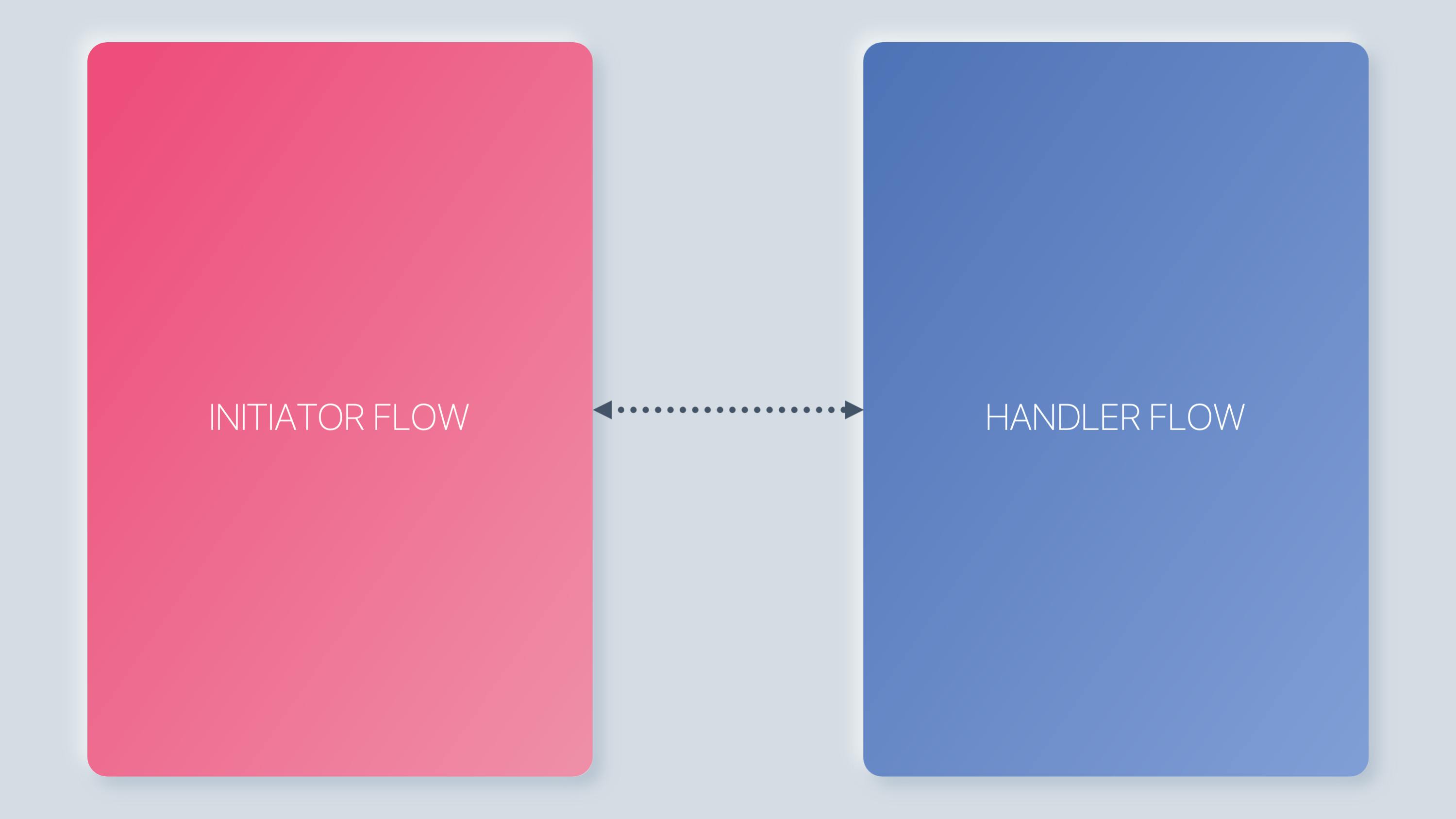In this article we are going to take a look at flows in Corda, understanding what they are, how to implement them and extend the Corda Flow Framework, and identify some best practices for flow design.
What are Flows?
Flows are a fundamental part of Corda’s design and represent protocols of communication and negotiation between counter-parties; for example, a flow may be designed to allow counter-parties to negotiate and agree on ledger state transitions, or to simply communicate over a peer-to-peer network, or even to extend functionality between nodes and clients over RPC.
What are Flow Sessions?
Flow sessions are the underlying mechanism that allow flows to communicate with other nodes on the Corda network. A flow session represents a secure, established, point-to-point connection between one node and another.
A flow session represents a secure, authenticated, point-to-point connection between one node and another. Unlike other blockchain technologies, Corda does not broadcast communications to the entire network. Instead, communication is strictly point-to-point.
An instantiated flow session provides functions for communication between nodes — send and receive. It is important that these functions are synchronised, otherwise you will end up with counter-flow errors.

To send data to another node on the network, we call the send function of the flow session:
session.send("Hello, World!")
To receive data from another node on the network, we call the receive function of the flow session:
val message = session.receive<String>().unwrap { it }
Note that when we receive data from another node, we specify the type of data that we’re expecting the payload to be (in this case String).
There is also a sendAndReceive function which we can use when we’re expecting an immediate response back from the other node; for example:
Party A expects an immediate response from Party B
val response = session.sendAndReceive<String>("Hello, Party B!")
Party B receives Party A’s message and responds
val message = partyA.receive<String>().unwrap { it }
partyA.send("Hello, Party A!")
Initiating and Non-Initiating Flows
There are two types of flow in Corda — initiating and non-initiating.
Non-initiating flows (or sub-flows) represent individual interactions, either with the local node, or with other nodes on the network; for example, the CollectSignaturesFlow and SignTransactionFlow can be used to obtain a counter-party signature for a signed transaction.

Another way to think about non-initiating flows is as framework flows; that is, a flow which contains some reusable intern-node communication or business logic.
Initiating flows represent ordered sequences of events; for example, creating a transaction, verifying and signing the transaction locally, obtaining counter-party signatures, finalising the transaction and committing it to the vault.

Initiating and Non-Initiating Flow Design
Initiating flows (application flows) and non-initiating flows (framework flows) are orthogonal, however there are cases where they intersect.
It is generally good practice to design flows as non-initiating first, so that they constitute a reusable unit of code, and then add an initiating flow implementation over the top, allowing the non-initiating flow to be called as an overall unit of work.
As a general rule of thumb, initiating flows create flow sessions, and non-initiating flows consume flow sessions. This pattern leads to consistent flow design, and reduces the overhead of creating new flow sessions each time a sub-flow is executed.
Designing Non-Initiating Flows
Non-initiating flows (or sub-flows) represent individual interactions, either with the local node, or with other nodes on the network. The following example demonstrates a simple pair of non-initiating flows which allow nodes to send messages to one another.
SendMessageFlow
class SendMessageFlow(
private val session: FlowSession,
private val message: String
) : FlowLogic<Unit>() {
@Suspendable
override fun call() {
session.send(message)
}
}
ReceiveMessageFlow
class ReceiveMessageFlow(
private val session: FlowSession
) : FlowLogic<String>() {
@Suspendable
override fun call(): String {
return session.receive<String>().unwrap { it }
}
}
Notice that flow sessions are passed into each flow’s constructor, rather than passing in a Party reference and creating the FlowSession instance internally. This means that you can eliminate the overhead of creating multiple flow sessions for each sub-flow, and just continue to reuse the same flow session for multiple sub-flows.
Designing Initiating Flows
Initiating flows represent ordered sequences of events.
Since the SendMessageFlow and ReceiveMessageFlow implementations aren’t annotated with @InitiatingFlow or @InitiatedBy they can only be used as sub-flows.
Rather than altering their initial implementation to turn them into initiating flows, we can add an additional class to each flow, which represents their initiator (annotated with @InitiatingFlow) and their handler (annotated with @InitiatedBy). The following example demonstrates the addition of a nested class to each non-initiating flow, allowing it to be used as an initiating flow.
SendMessageFlow
class SendMessageFlow(
private val session: FlowSession,
private val message: String
) : FlowLogic<Unit>() {
@Suspendable
override fun call() {
session.send(message)
}
@StartableByRPC
@InitiatingFlow
class Initiator(
private val counterparty: Party,
private val message: String
) : FlowLogic<Unit>() {
@Suspendable
override fun call() {
val session = initiateFlow(counterparty)
subFlow(SendMessageFlow(session, message))
}
}
}
ReceiveMessageFlow
class ReceiveMessageFlow(
private val session: FlowSession
) : FlowLogic<String>() {
@Suspendable
override fun call(): String {
return session.receive<String>().unwrap { it }
}
@InitiatedBy(SendMessageFlow.Initiator::class)
private class Handler(
private val session: FlowSession
) : FlowLogic<String>() {
@Suspendable
override fun call(): String {
return subFlow(ReceiveMessageFlow(session))
}
}
}
Summary
We’ve identified what flows are and how they allow node and inter-node communication on a point-to-point basis with counter-parties on the network.
We’ve seen examples of non-initiating flows (framework flows / sub-flows) and initiating flows (application flows).
We’ve identified a best practice design that allows orthogonal flows to intersect so that they can be used as either initiating or non-initiating flows, without having to create separate classes, or duplicate code.
